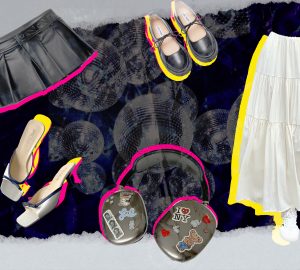
I recently met actor Miles Teller but afterwards, I encountered an unusual dilemma: I couldn’t post my photo with him on Instagram because it didn’t match my profile’s aesthetic. I stared at the photo of myself snuggled up with Teller, his arm around me and a squinty eyed smile on my face. I stared at it and I couldn’t post it.
I tried all the filters on Instagram before resorting to higher quality tactics. I downloaded apps such as Fotor, PicLab and Color Story, all of which promised me the perfect photo effects. My photo needed to match my golden sun-streaked profile that I had crafted with each and every post. After flipping through every warm tone filter, I put my phone down in defeat.
Our society invests a shocking amount of effort into creating an Instagram aesthetic. Some users have over a million followers simply because they post regularly and have a pretty aesthetic. Blush-tinted photos of a young woman eating a colorful salad, sitting with a book at a trendy coffee shop or posing in front of a mural appearing to look candid. Who wouldn’t want to follow her? I have grown to associate Instagram aesthetics with a person’s real life. Post the perfect moments and everyone will believe you have a perfect life. They will like you. They will follow you. They will strive to be you.
Instagram aesthetics are essentially the cosmetics of social media; they mask the imperfections and highlight the beauty. The problem? It isn’t real. No matter how glowing and beige Lauren Conrad’s Instagram appears, she still lives in the real world with real life lighting and winged eyeliner that inherently smears. No one walks around with perfect makeup, outfits, lighting and filters. But I seem to have forgotten this. I seem to have forgotten this is okay — it’s more than okay, because real life is raw and messy. Real life is human. If we lose our human aspects, what do we have left?
I scroll through my newsfeed and land on a photo of actor Justin Baldoni standing in a grocery store watching his daughter throw a temper tantrum on the floor in front of everyone. The photo is accompanied by an extended caption which discusses the importance of not being embarrassed when your child reveals their emotions in public and to remember it’s human to feel deeply about something. This photo is absent of a filter and is lacking the “I have a perfect life” mask. It portrays a real-life parenting moment. I stopped scrolling and read the entire three hundred and fifty-word caption. Then I re-read it.
Then, I post my Miles Teller picture and bask in how it stands out amongst my gold toned profile, the way my smile is crooked and my hand is awkwardly placed because this is a human moment. My Instagram aesthetic will soon be replaced with no makeup and real smiles, maybe even the snapshot of me in Little Italy with a mouth full of cannoli. My Instagram aesthetic will be me.






















